"Christ's is the perfect location if you're applying for a science subject - I only have a five minute walk to lectures."
Juliet is from Ealing in West London, and wrote this at the end of her first year studying Medicine here at Christ’s College, Cambridge. At school, Juliet took A-Level Maths, Biology and Chemistry.
Why did you choose Medicine at Cambridge?
I was really interested in the Medicine course at Cambridge due to the really strong scientific aspect of it in the first two years. This means that you gain an great understanding of pathologies before you see their manifestation in clinical years (years 4-6). I had initially wanted to do Biology at university, so this way I still get to study a lot of the same things, whilst eventually moving into a job with more human contact and less laboratory work. I also really like the way the course is split into subjects that you could do independently as a degree – for example, Biochemistry or Physiology - as this helps you to figure out which area you’d like to specialise in in the third intercalated year of the course. Another thing that really attracted me to this course specifically was the full body dissection component of the anatomy course, something that isn’t offered at a lot of other medical schools.
I was quite nervous about the idea of writing essays, something which I hadn’t done since GCSE. I had also never written an essay about science before, only humanities. This lead to my first few essays being quite unpolished and badly structured. However, I once learnt how to filter my ideas and make my essay flow with a better structure I found the whole process much less daunting. Writing an essay a week for Biochemistry and Physiology was also invaluable practice for the exam at the end of the year. I found, towards the end of the year, that essays are a great place to put any extra knowledge and get a few extra marks.
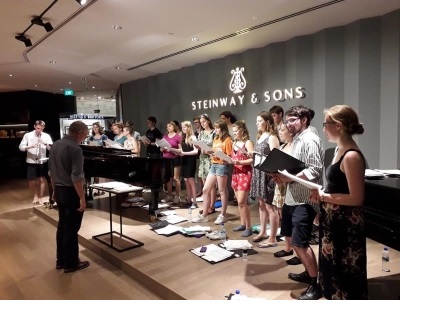
And why Christ’s?
Before coming to visit, I read the unofficial and official prospectuses for Christ’s and a few other Colleges so that I could narrow my choices down. When I went to the Open Day, I chose to look at the Colleges that fitted my top two priorities - being close to the science campus and not being too big. Christ’s is a perfect location if you are applying for a science subject – I only have a five minute walk to lectures, or ten if I have a lab or dissection. The student body at Christ’s is also a medium-sized cohort, with around 125 undergraduates in each year. If you are unsure about which to apply for, I would say visiting was a deciding factor for me – we have Open Days for different subjects throughout the year if you miss the university-wide one.
The College also gives lots of support both financially and pastorally. In my first year, all freshers were given a book grant, and this helped me get books like Gray’s Anatomy that will be useful to me for the rest of my career. Even if you can’t get your hands on a certain book to buy, or it is too expensive, you can always request it from the College library. I also received some accommodation support right at the beginning of first year when I was worried about the location of my room - I eventually managed to get a last minute swap, for which I am very grateful.
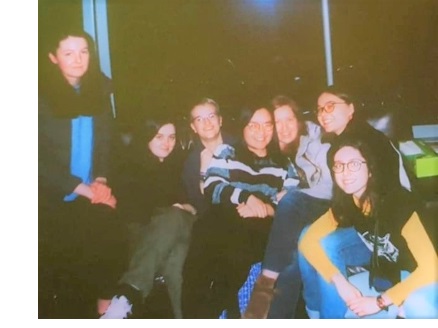 What do you think of the collegiate system in general?
What do you think of the collegiate system in general?
I think the collegiate system is a great way to expand your social circle! You meet friends in your subject at lectures and practicals, friends in College by seeing them around in the mornings and evenings and friends doing your subject at your College because you have supervisions together. The layout of Christ’s in particular is such that you bump into loads of different people every day, and this gives you a chance to socialise with people you might not have met otherwise.
So far, I haven’t spent much time at other Colleges in term time, mainly because most of my friends and societies are in College. However, I’ve been to a few formal dinners at other Colleges, like a St David’s Day formal at Churchill. For the most part, it’s very easy to go and visit your friends at other Colleges and for them to come and visit. Some societies also have their sessions at a particular College every week, so that gives you a chance to see other Colleges.
What was your interview experience like?
I started preparing for my interview the summer before I applied by reading books both about science and about a career in medicine. I was advised by my school to read more academic books due to the nature of the course, so I ended up reading mostly about scientific research. Some resources that I found useful, and enjoyed exploring, are:
- ‘The Man Who Mistook His Wife for a Hat’ by Oliver Sacks
- ‘Madness and Memory’ by Stanley Prusiner (about the discovery of Prions)
- ‘The Family That Couldn’t Sleep’ by D. T. Max
- ‘Medical Ethics: A Very Short Introduction’ by Tony Hope (this book was especially useful for the SECHI ethics course in first year)
- ‘Stem Cells: A Very Short Introduction’ by Jonathan Slack (this book was useful for the MIMS biochemistry course in first year)
- ‘Medical School Interviews’ by Picard and Lee
- NewScientist magazine (great for accessible articles about new discoveries - most local libraries have a subscription)
- Student BMJ (British Medical Journal)
- University of Glasgow online course ‘Cancer in the 21st Century’ (this was also useful for MIMS)
- Gresham College record their lectures and post them online (there is a great medical science section)
- The Medic Portal have a good section on preparing for interviews
The interview was similar to my expectations, in that I was asked very in depth questions that I didn’t know the answer to straight away but had to use my A level knowledge to try and figure out. However, the interviewers themselves was calmer and less intimidating than I had imagined, and I found that the more I opened up and spoke my mind the better the interview flowed. I also expected the interview to be much longer than it actually was.
And how did you find the application process in general?
To be honest, I found the application process quite stressful, but I don’t know many people who didn’t! It was very difficult balancing the UCAT in September (which isn’t needed for Cambridge but is for many other medical schools), the BMAT in October, Cambridge interviews in December and staying on top of my A-Levels. However, you can make it less stressful by being more prepared, and by taking the admissions exams as early as possible to leave plenty of time for interview preparation and A-Level work.
For Medicine at Cambridge (and at Oxford, Imperial, UCL, etc.), applicants are required to take the BioMedical Admissions Test (BMAT). Most other universities require the UCAT admissions test, so after preparing for that and sitting it I found myself with a month to prepare for the BMAT. Thankfully, there is a little overlap between UCAT material and section 1 of the BMAT. At the time, I was so worried this wouldn’t be enough time but I think you can prepare properly with enough work. I used the ‘Get into Medical School – 700 BMAT Practice Questions’ by Campbell and Picard, and with hindsight the questions in there felt harder than the actual exam questions. I also worked through ‘The Ultimate BMAT Guide: 800 Practice Questions’ by Agrawal, which was of a more appropriate difficulty in my opinion.
"I found that the more I opened up and spoke my mind the better the interview flowed."
What advice would you give to prospective Medicine applicants?
The best piece of advice I could give in terms of applications would be to start preparing early, otherwise all the exams and interviews feel like they are coming all at once. If you are taking the UCAT it’s possible to do so as early as July, which gives you more time for BMAT, especially as you can now take it in late August instead of late October if you want to. This would not only make your UCAS application in October way less stressful but would also allow you to apply knowing both your UCAT and BMAT scores. I would also advise you to pick an extra reading subject that you particularly like and use it as your area of special interest. For me, that was neurology - I read books on neurodegenerative diseases like FFI, prions and other neurological disorders.
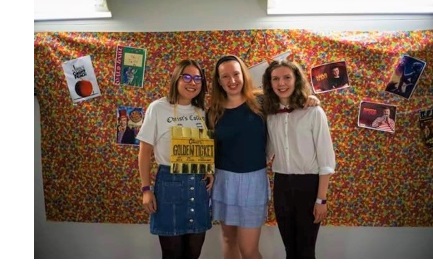 What was your first week at Cambridge like?
What was your first week at Cambridge like?
I came to Cambridge without taking a gap year, although I did get a job on results day which I worked at until a few days before arriving. I spent this time getting excited about all the new people I was going to meet and looking forward to trying out new activities such as rowing. However, I was really worried about not being able to keep up academically or socially. I came from a small sheltered girls school that I’d attended for 10 years, so I hadn’t had to make new friends in a while. Initially I found it hard settling in and was really homesick. However, after I stopped trying so hard I found it much easier to fit in and found some amazing friends in unexpected places, like the College choir.
Fresher’s Week was one of the most hectic weeks of my life- but fun! To be honest it felt like a summer camp, doing things every hour of the day. I think Freshers’ Week’ really is what you make of it - I wanted to be busy and do things, but it’s perfectly fine to just relax, get an early night and do what you like. One of my favourite memories of fresher’s week was the Roald Dahl bop, where I met many future friends. We also went on a theatre trip to see the Footlights organised by CADS (Christ’s Amateur Dramatics Society) which was a great way to experience what the Cambridge comedy scene has to offer!
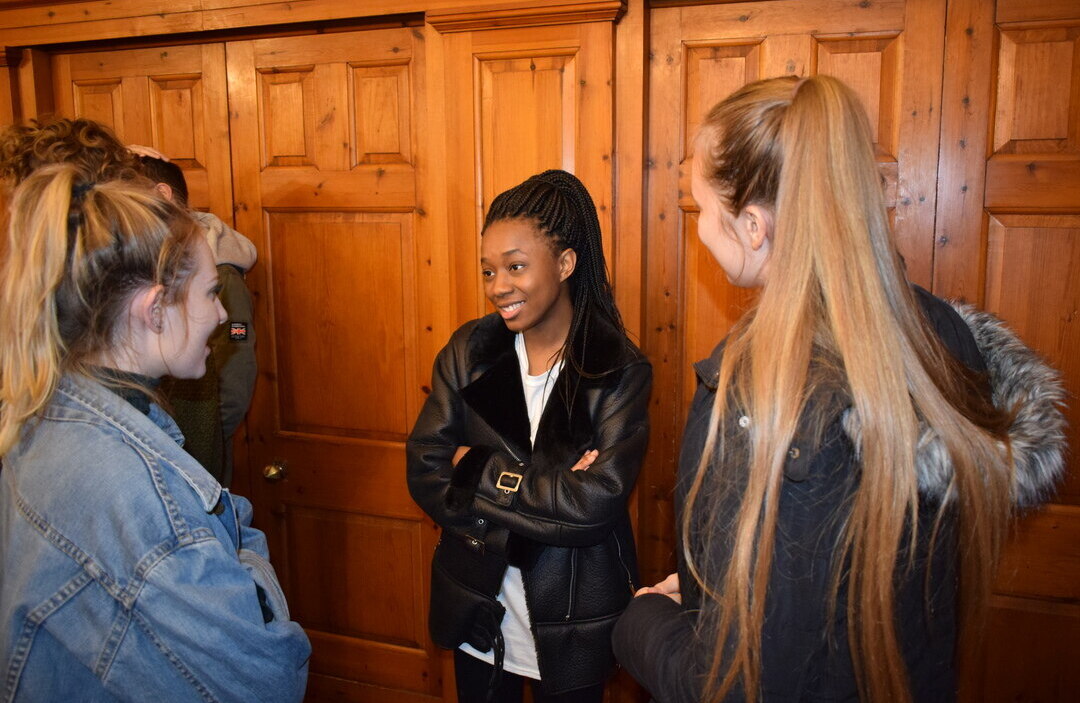
How did Cambridge compare to your expectations?
When I started, I was surprised at how small the town was, which is probably because I come from London. It didn’t quite hit me until I walked across Cambridge and realised how great it is that nearly everything is just a quick walk away. I was also surprised at how reasonable the room prices in Christ’s are. I had a room in Blyth building in third court and it was much bigger than my room at home, had a great view and was really warm in winter! I never expected to have such nice accommodation.
My first week of lectures and supervisions was pretty much exactly what I expected. We had introductory lectures and labs, mostly just going over old A-Level stuff and a gentle overview of what was coming ahead. Supervisions were mostly just getting to know the supervisor and discussing what to expect from the supervision format. I remember feeling really excited and wishing we would get onto more detailed content, which then happened all at once only a few days later!
"I never expected to have such nice accommodation."
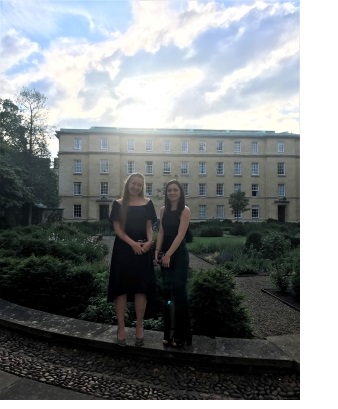 And the course?
And the course?
The course has been just as full-on as I expected when I applied, with lots of contact hours and long days. I like having a really built-up structure though, otherwise I tend to procrastinate a lot. Having less time has definitely made me more productive and less of a perfectionist. However, I didn’t expect there to be supervisions on weekends, which ended up being the case often because some of our supervisors have other jobs during the week. Most of the time this was fine, but it makes arranging to visit home for a weekend more difficult. The workload now is definitely larger than that at school, but its more stimulating due to its variety. For the first two terms, we were took five subjects - Biochemistry, Anatomy, Physiology, Ethics and Statistics. In an average week, we might have a Physiology essay alongside preparing for a Biochemistry presentation, and an argument to debate for Statistics. Having said this, essays do seem to predominate, due to medical students in general having had not much essay practice by the time they reach university.
In second term, I really struggled with the workload. My grades weren’t as high as I’d have liked them to be and we had to prepare for the Ethics and Statistics exams coming up at the end of the term. I also found the lack of repetition difficult. For A-Levels, you would be taught something in class, go over it in revision lessons, practice it in past papers and then get the chance to go over it again at least once. At uni, throughout the year you get lectured, get a supervision covering a few lectures at once, then move straight on. I overcame this by prioritising academic tasks to prepare for, and learning to procrastinate less, which I’d done a lot of the term before. It definitely meant cutting down a bit on social time, but once I learnt to work more efficiently it became easier. I also learnt to not get too bogged down in details throughout the term time so I could carry on getting through the content, and then use the holidays to revise.
How is your course taught?
In first year, there are five modules. Physiology and Biochemistry each have three lectures a week, Anatomy has two and Ethics and Statistics each have one (Ethics and Statistics only run through the first two terms before the exam at the end of second term). We normally have one supervision for Physiology, Biochemistry and Anatomy per week (sometimes two depending on the scheduling) and three ethics lectures a term. There are also labs for Physiology (one every two weeks), Biochemistry (one a term) and Anatomy (two dissections per week). This all equates to an average working day having five contact hours, ranging from two to eight hours each day. In exam term, contact hours slowly fizzle out and we end up having two weeks of no contact hours just before exams (still with supervisions though). I go to most of the lectures, although they’re not compulsory and some people strategically miss certain ones if they know they’ll get more out of self-teaching the topic.
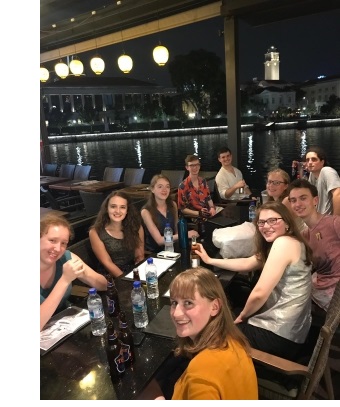
and New Zealand
I manage the workload by trying to get smaller tasks done as soon as they’re set, and leaving bigger tasks like essays for the weekend because they take a good amount of time to do well. This doesn’t always go to plan, and sometimes I have to compromise on other things to allow for all the work to get done. My favourite topic from this year definitely ended up being Anatomy, due to the fact that it’s much easier to visualise than molecular concepts. I also enjoyed how it was the most clinically relevant topic. Every week we would get a list of clinical applications of what we’d learnt in the dissection manual, coupled with X-rays, CT scans and prosections of pathologies, which made the vast amount of facts easier to memorise.
What are your favourite, and least favourite, things about Cambridge?
One of my favourite things about Cambridge is the close-knit nature of the Colleges, meaning that you are almost guaranteed to bump into someone whilst out and about to have a chat to. Cambridge is such a beautiful city, and in the summer I love going punting with friends along the river. My least favourite things about Cambridge would probably be the pressured atmosphere in exam term when people start prioritising revision over socialising. I felt a lot of pressure to do well and with my cohort being so academically strong that felt very hard at times. However, now that I’ve passed first year I feel like I have a leg to stand on and no longer feel so out of place.
"One of my favourite things about Cambridge is the close-knit nature of the Colleges."
open to students from May to
September
What do you do in your free time?
When not working I like going round to friends’ rooms for cups of tea, cooking together and going for walks in the nearby parks (Christ’s pieces or Parker’s piece are both very close). In the summer term, you can go punting along the river, go on bike rides to Grantchester (a village near to Cambridge) and swim in the Christ’s outdoor pool. After exams are over, there’s loads of garden parties, celebrations and also May Balls, which are just night-long parties. I went to Jesus May ball this year which is one lots of freshers go to. There’s also a special MedSoc ball in February which is more reasonably priced.
I’m also involved in the Christ’s Chapel Choir, which is a great way to meet friends not in your year group (and even out of College- lots of the choir aren’t from Christ’s). I auditioned for choir in Fresher’s week, though you can join at any point throughout the year whenever there are vacancies. The choir has three rehearsals a week, two of which are followed by Evensong on Thursdays and Sundays. This all happens in the Christ’s chapel. To help us improve at singing, we get free singing lessons weekly one-on-one with a professional singing teacher, which helped me loads last year. We also get a free formal dinner after each Evensong, and there is always choir pizza at the start of each term! In addition, once a year there is a special choir dinner to celebrate the year. It is a significant time commitment but it’s really great fun.
The choir also goes on tour every summer- this summer we went to Singapore and New Zealand, which was the trip of a lifetime. The tours are heavily subsidised by the College and the ticket sales from our concerts. This means that the tours end up being very affordable, enabling everyone to get a chance to experience touring as a musician.
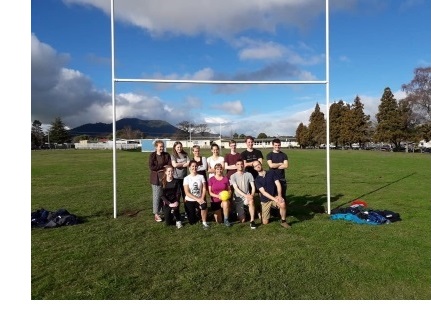 What are you looking forward to next year?
What are you looking forward to next year?
Next year I’m really looking forward to knowing how to properly learn the content and what’s expected of me in supervisions, things I never really grasped last year. I’m also looking forward to getting ‘College children’ - first year students that you get to mentor. We arrange brunch and family dinners with our College children in first term of second year, and give them advice and support throughout the year.
Second year medics don’t get a choice of papers- we all have to take Pharmacology, Head and Neck Anatomy, Neurobiology, Human Reproduction and Pathology. We also have a week long placement in Addenbrooke’s hospital as part of the Preparing for Patients course- the only clinical feature of next year!
Next year I’m going to be sharing a house on Jesus Lane - a street of College-owned right round the back of Christ’s - with seven friends. I’m really looking forward to living in an actual house rather than a sometimes isolated room, as I think it will feel more like living with a family again.
August 2019
Please be aware if you're considering an application that our student writers describe their experiences. Although the majority of the information stays the same, some details may change from year to year. Do read the student profiles in combination with our undergraduate admissions pages for full information.
Back to Student profiles page / Medicine at Christ's / Next: Barnaby's profile
